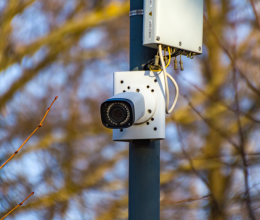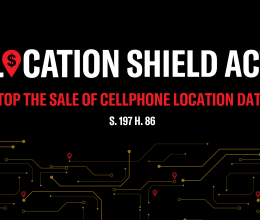
Face surveillance: Science fiction or status quo?
You’ve seen it on TV or in the movies: police are investigating a crime, and they ask a witness to pick the culprit from a lineup — a handful of suspects, maybe a half-dozen of them. Sometimes they pick the right person. Other times, the witness gets it wrong.
Now consider this: at this very moment, you may be in a lineup yourself — though you wouldn’t know it. Right now, someone, somewhere, could be comparing a picture of your face with a picture of a suspect. Nobody will ever tell you this is happening, and you will never get the chance to opt out or contest your inclusion. No judge signed off on this process, and no elected official authorized it. In this case, instead of a person identifying you, it’s a piece of software — one that’s known to make mistakes. Even if it doesn’t flag you as a match this time, your photo will always be there in the database, ready for the next search. This lineup never ends.
It’s not science fiction; it’s the status quo — but we have a plan.
Last week, news broke that federal agencies like ICE and the FBI are secretly accessing state driver’s license databases to scan millions of photos — using face surveillance technology — in order to identify possible suspects. Documents uncovered by researchers at Georgetown’s Center for Privacy and Technology show that it can be shockingly easy for federal agents to access this highly sensitive data — sometimes all it takes is an email. That means millions of people with driver’s licenses are subject to invasive searches without their knowledge or consent, every day. Federal agents do not need a warrant or even probable cause to scan your photo — the practice is entirely unregulated in Massachusetts and nationwide. Even worse, face surveillance technology is prone to serious errors, misidentifying Black women up to 35 percent of the time in some systems.
Face surveillance technology poses unprecedented threats to our civil rights and civil liberties, and across the country, there’s a growing movement to “press pause” on this dystopian trend. The cities of San Francisco, Somerville and — just this week — Oakland have all passed ordinances banning municipal use of face surveillance.
Massachusetts voters get it: an ACLU poll shows 76 percent of voters do not think the government should be able to monitor and track people with face surveillance technology. We agree – and that’s why the ACLU of Massachusetts has been working on this issue and raising concerns about the dangers of face surveillance technology for some time.
In February 2019, we asked MassDOT to hand over all documents related to the use of their Registry of Motor Vehicles (RMV) database for face surveillance. In April, we asked for information about how the RMV shares its database with law enforcement, and how often they run face scans. MassDOT and the RMV ignored us, so last week we filed suit. From prior public records work, we know the state RMV has been using face surveillance technology since 2006, absent any legislative authorization or independent oversight. But we know virtually no details about how many times the technology has been used to identify people, for what reasons, or in which circumstances. Secrecy surrounding government use of face surveillance is intolerable in a free society.
In response to recent news reports, MassDOT said that “the RMV cooperates with law enforcement on specific case by case queries related to criminal investigations, but does not provide system access to federal authorities and is not negotiating to do so.”
Here's why that answer doesn’t satisfy us, and why we can’t take the government’s word for it that their use of face surveillance is above board:
First, privacy advocates are not alleging that law enforcement agents have “system access” to the driver’s license database. In other words, we don’t have reason to believe that ICE or the FBI can log in to state systems whenever they want. The problem is that when government agencies want to run a face surveillance scan, there are no checks and balances in place to make sure the system isn’t misused or abused. As far as we know, all it takes is a request submitted via email. Just as a police officer shouldn’t be able to rifle through your home computer on a whim, government agencies shouldn’t be able to use your photo in a virtual lineup whenever they want.
Second, it doesn’t particularly matter if the RMV cooperates on a “case by case basis.” What matters most is how often the RMV receives face surveillance requests from law enforcement, how often they accept or refuse, and on what basis. If the RMV accepts all requests they receive, then “case by case” doesn’t mean much, since every case gets handled the same way. The truth is that we have no idea how the RMV shares its driver’s license database. That’s why we’re suing to find out. We have a right to know how the government is using the faces of ordinary people in Massachusetts in dragnet surveillance operations.
Finally, even if the RMV had a perfect answer to our questions, it means nothing if we can’t see for ourselves how the system works. The agency acquired face recognition software in 2006; yet, in the 14 years since, we have learned virtually nothing about how and when it has been used. Face surveillance technology gives the government unprecedented power to track who we are, where we go, what we do, and who we know. But despite these profound dangers, there are no laws establishing safeguards for privacy, free speech, racial justice, or due process. It’s the wild west, and with the stakes so high, vague assurances from the government aren’t enough.
At a time when the government is using flawed, experimental, and unregulated technology to conduct warrantless scans of our personal information, transparency is the first step toward accountability.
Face surveillance is a clear and present danger to our civil liberties, and the ACLU is fighting back. In June 2019, we launched “Press Pause on Face Surveillance,” a campaign to build awareness about the civil liberties concerns posed by face surveillance technology. We’re calling for municipalities to ban government use of face surveillance technology, and for the state legislature to pass a statewide moratorium on government use.
In the hands of authoritarian governments, face surveillance is a powerful tool of oppression. It’s not too late to make sure the technology doesn’t get out ahead of our basic rights. If we want to prevent a dystopian police state right here in Massachusetts, we must take action to ensure our lawmakers act. Join us.
Related content

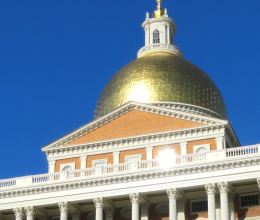
ACLU applauds new landmark data privacy legislation
May 6, 2024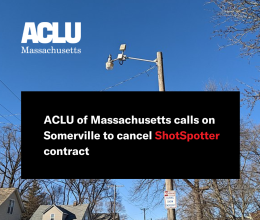
ACLU of Massachusetts calls on Somerville to cancel ShotSpotter...
March 14, 2024
Cellphone location data used to target abortion misinformation to...
February 13, 2024
Lawmakers file bill to ensure the responsible use of robots
September 13, 2023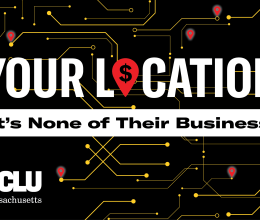
Advocates, experts call on lawmakers to ban sale of cellphone...
June 26, 2023
Reproductive advocacy groups launch campaign to bolster patient...
June 14, 2023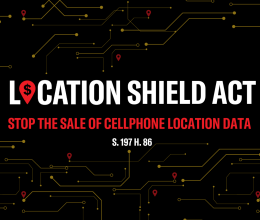
Ban The Sale of Location Data
June 2, 2023